Compliance With "Vibes" is the Primary Business Activity in The West
Coursing through the veins of the private markets by force of slogans is a 'self-sustaining' ideology for keeping degrowth in play, no matter the external cost.
[Edit: the hyperlinks in this one are special - please click liberally]
I have many libertarian tendencies - probably more than any of my friends or family, but I also recognize the limits of its stupider ideas, like open-borders, and in principle would mostly side with conservatism if there was anything left to conserve.
They say we need a government to build roads and basics services - the original case for getting together to pay for something that we all need. Operative word being “all”. The roads argument is actually one of the less good pro-government arguments, given that roads are by their nature, not just decentralized, but reside in different political geographies, often resulting in the kind of road the locals roughly “want” to pay for – the contrast of highway conditions at the Texas/Louisiana border comes to mind.
Minarchism would be the least amount of centralized control possible: build roads, provide basic policing and defence of national borders - which I mostly side with.
Many people rightly dislike centralization for its propensity for tangled incentives and moral hazard. Here I‘m going to look at why aspects of decentralization and privatization can exhibit its own similar risks while, in many cases, being more unstoppably dangerous than anything your average lethal government can conjure.
We saw this with covid. What appeared at first glance to be the world’s biggest ever top-down group-control edict, was actually the collective force of a million atomized actors, all with a fundamental misunderstanding of what constitutes legitimacy, mandate, authority.
Here I wish to to ‘attack’ the specific mechanics and the psychological element of why certain post-pandemic trends have caught on in business, and sometimes fascistically crept into cultural life as well, as if the pandemic never ended.
Andrew Côté describes “The Blight” in this extraordinarily powerful thread about the layered malaise of Fiat Everything World and its consequences on our lives and psyches:
The reality is we could've easily mastered energy, food, and material abundance with 1970s era technology. Instead, we loaded up on virtue signaling, stakeholder engagement, and regulatory capture. I call this general phenomenon "The Blight".
The Blight is what gives you things like billion-dollar a mile railroad tracks in San Francisco, never completed high speed rail in California, the NRC killing nuclear energy, Ariane Space, a bunch of go-nowhere climate tech bubbles, Don Lemon, affirmative action, etc.
The Blight is a disease of wealth. Any society faced with genuine survival pressure can't afford the Blight, or else they perish. The Blight exists solely as a parasite suckling off the insane wealth generated by industrial capitalism.
The Blight is endless bureaucracies, outsourcing, McKinsey consultants, feel good diversity panels, DEI committees, ESG, biofuels, carbon credit marketplaces, NIMBY anti housing socialism, "math is racist", denies biology, natural variance, etc.
The Blight is simply a manifestation of petty tribalism and grift in the modern age Most usually it leverages a feel good narrative of inclusion or else just sells fear to justify centralization of control. The net effect of Blight is inflation and declining birth rates.
The Blight is fundamentally antithetical to what is good in the human spirit -perseverance, competition, innovation, decisiveness, execution, imagination, risk-taking, adventurousness, and integrity.
The Blight has produced endless millions of do-nothing paper pushing jobs with titles like Analyst, Coordinator, Engagement Officer, Committee Chair. It is the reason education, healthcare, and government services have all declined in real value per dollar spent.
The Blight cannot exist wherever there is free and fair competition. It can only grow and take root where people let it, when they give in to peer pressure and crowd conformity to do what they know is not truly fair or just.
Fuck the Blight.
This very recent example of a blight bugman walking into the brick wall that is reality, is in many senses not the kind of thing we like to see repeated, for how it reminds us that the consensus class are not only incapable of leading but are now actively weighing us down.
Sustainability, DEI: “It’s Happening”
The difference this time is that the bandwagon of joy and life-affirming purpose is for Western nations only.
The wealthier and whiter the nation, the more their true business innovation and productivity gets kneecapped by the high beta, fiat delusions that grow like cordyceps out of the download-your-McKinsey-update, HR supremacist, bugman culture.
Côté put this perfectly: “[Many sectors have been] optimized into stagnancy, horizontally dissociated […] regulatory capture and ineptitude.”
China is not woke. China is not on the hook for ESG compliance, emissions targets - or DEI. China is building two new coal power plants a week, in order to keep up with the industrial demand for the manufacture of solar panels and windmills for everyone else. On these grounds alone we can see what a hollow proposition sustainability is.
Of course, there are no limiting principles to sustainability, on principle. And the DEI sections of the consultancies’ websites can’t exactly disappear, or even have an end-date in mind, because thousands internally would be out of job, and this is after all about Progress.
Although government-sponsored legal mandates are not raining down on us from the sky, the heavy lifting of public coercion and symbolic buy-in is actually done by private corporations, spawning these idea pathogens into material risk for ordinary citizens by force of in-group consensus and self-congratulation.
From management and marketing trends dripping in identity-based navel gazing, to medicine, to climate, we are continuing to see the embedding of virtue signaling - replete with all the tail risk that brings, and becoming the new normal in corporate life. All of which require present-day drawdowns on efficiency (lack of productivity) and quality of life (inflation) as we see new parasitic bureaucracies installed, and the corporate-cultural encouragement of a Soviet-like obsession with internal life and dynamics. Which all seems a bit odd for “capitalism”.
In business, we are slowly forgetting what the “outside” market looks like, what competing feels like, and what producing quality actually means. Most of all, we forget how to communicate these idiosyncrasies to a market of citizens who are not stupid and do not need nudging.
In medicine, we forget what real health actually consists of (sunlight, fresh air, natural food). In life, living in a climate, we forget that the weather changes, and that eight times more people die of cold than of heat.
The “It’s happening” grift makes for a great product for consultancies to sell to companies that are happy to settle for a patina of “innovation”, and for banks to play-act that they are supporting jobs growth, as their MMT dreams become unrulier and more difficult to manage the optics, in the face of very real potential for collapse.
Politics is dead, meet compliance
In the emerging bureaucratic imaginary, everything is reduced to compliance, becoming in the process a kind of moral absolute. “Non-compliance” is by definition wrong, so all forms of social, political, and cultural opposition are now being defined in terms of “non-compliance.”
The movement from a codified legal framework to a real-time, compliance-based regime, where wrongdoing is defined not as the commission of a particular crime, but by a subjective, ad hoc sense of the wrongdoer being out of alignment with network values.
Norwegian anthropologist Tereza Kuldova, in her podcast appearance on The Popular Show, goes on to describe in appropriately anthropological terms how market vectors, complex systems and a desire for career advancement (say the right things) have led us to a point where compliance simply begets more compliance.
John, the host, nails down the phenomenon: “So the dynamic is, there’ll be some scandal, or some conflicted reckoning where suddenly every right thinking person is very concerned about this particular issue, and then in response to that, there will suddenly be an impeccably credentialized set of people who step forward and say, well I’m the expert in this, my company is the expert in this, we can make your company/body/institution compliant to these new regulations that are coming in response to the scandal. But what they actually do is not resolve the problem or the scandal - and after all it’s their job to always be reacting, so it’s completely outside their interest to actually resolve it, even if they could. And so instead they sort of keep swelling the bureaucracy around the issue, employ more and more forms of oversight etc. The other interesting thing is that it always has to be deployed in reaction to something nobody could disapprove of. Corruption is the outstanding example - who is for corruption?”
By managing us into this bureaucracy, or the managed decline, we see the formation of this odd little feedback bubble. Davos Man, who was supposed to be embarrassed out of existence on hearing the label ten years ago, has persisted, and now infected the middle rungs of the PMC with the broader “purpose” or “impact” cordyceps.
We are used to seeing truly bad ideas come only from governments.
It’s no secret the last five years have been a confusing time. I could put it many other ways, but that is how I’ll leave it for now. As they say in Business, “if you are not confused, you are not paying attention.”
Perhaps a few more people today have the courage to distrust the government, but how many have the courage to distrust the all-inclusive kumbaya circle that has taken over private companies, self-sustainingly?
Perhaps our human minds just can’t keep up with how dangerous brainwashing can be, and that the feedback loop that the industrial complex it brings with it, can casually morph from B2C brainwashing to B2B - making it self-sustaining. In both cases there is no legitimate mandate to embark on such a process.
One can of course argue that “this is what the market wants” because the buzzwords are flying and the fantastic ad budgets give the impression of there being a market for what is being “sold”. Ask a person in the street something as disingenuous as “are you for sustainability?” and you will see why the financial services, and consultants, are in no rush to terminate this train yet. Well, that is what generalized, unfocused coercion does. But just one ounce of the right kind of doubt, though, could bring the house of cards down for good.
Given the multifaceted conflicts of the culture war, the war of information itself and perverse incentives has led to some bizarrely eager commissar-like behavior of the private sector, with its bristling HR departments and armies of marketers - not all, but most of whom one might recognize from such previous debacles as “The Covid Pandemic” with its lockdowns and associated economic ruin, and how the very proposition of “a global pandemic” became so visibly stretched as the words, actions and realities all around us slowly began to align less and less. (The eager commissars from the covid era are now extremely, unbelievably quiet. And often there is more signal in that fact.)
But, people are easy to manipulate, and we know exactly how this happened:
ESG: The Theocratic Trifecta
ESG describes a subset of what I call GAE economics or reset economics, a function of late-stage fiat/inflationary capitalism that is fundamentally slogan-led, and lacking in useful or workable consensus of meaning. It has been through at least five serious rebrands: “It’s about the environment”, “It’s about being good”, “It’s about balancing stakeholder interests” and, surely the most hilarious, “It’s about measuring risk” - most hilarious because when you dig in on this one, you will get answers like “risk of not being diverse enough”. You can see how slippery the slope is.
Honest people know it can’t get back up, but to the die-hards employed by the leviathan industrial complex - and closer to the money printer - it’s never been more alive.
Inadvertently (((or not))), ESG removes true price-discovery from the marketplace, making inflation show up in bad places at bad times, all over the world, and in no easily predictable way - and whose data monitoring systems quite patently pave the way for complete global tyranny.
Elon Musk once said, "Possibly the most common error of a smart engineer is to optimize a thing that should not exist." The ESG framework undermines free-market principles and individual freedom, while simultaneously confusing the issue of what we are ultimately trying to optimize for.
So, basically, not only does this involve not actually optimizing for any one thing, it eats at the most important variable of all: interest rates - the one metric on which there is global consensus of meaning - time value of money is so utterly fundamental to productivity and the incredible quality of life we have been able to generate as result of it, in spite of the fed.
Beneath ESG’s benevolent exterior lies a Trojan horse laden with dangerous consequences of many kinds. Companies and projects that organize fiercely around this “larger” purpose of “doing good” tend to not be that interested in ordinary market feedback, abandon the drive for true innovation and differentiation, and lead to a homogenization of offerings utilizing increasingly authoritarian communications. This de-recognition of true demand, and erosion of differentiated competition, stifles real economic growth and hampers the quality of life for all.
The underlying premises of ESG - its “legitimacy” - is climate alarm and hysteria (how many more hysterias can we take?) and identity politics. Acceptance of just these premises leads to many other disastrous consequences down the road: heightened racial awareness in the workplace, people gluing their faces to roads, destroying art, and generally making young people either want to kill themselves, or kill everyone else by “stopping the use of fossil fuels immediately.” It is the core mechanic of Woke Capital. These are the lowest hanging fruits that need to be pruned for good.
Energy and South Africa
By far, the supply of energy supply makes the most sense of all to centralize - given the economies of scale of generation and what that means for macro economics, commodities prices, productivity, the environment, full-chain carbon footprint, etc. Real economies of scale, like a nuclear reactor or five - not hundreds of thousands of solar panels and windmills transported on diesel trucks and ships, to every most distant corner of every country. Plus, the wires are all still there from our perfectly functional previous efforts to centralize generation. One only needs to connect them to a source of energy for everyone to get some.
We did this efficiently and extremely prosperously until the Anti-Nuclear Agenda took hold, upping the FUD with a decades-long drip-feed of highly suspect Fukushima narratives. In South Africa we are a resilient bunch [*puke], but sometimes this story goes too far and we assume that sorting out our own power privately is “the answer” as with most other things that we do, that the govt is no longer capable of doing.
Here, Rand describes the statist but weirdly this view and drive is now expressed via the private markets. As we see with solar panel and windmill power, they possess a unique ability to avoid accountability for lack of electricity delivery – when a thousand distinct private actors, all separately pushed around by already insane government rules, are just onboard the train - nobody can be held to account and basically the government does all the “just wait another ten years” marketing on behalf of these private actors.
Isn’t that convenient? We are talking energy, and every citizen’s productivity – with all the long-term economic implications that entails. Decisions in this sector are the most consequential. We used to be able to vote out governments that did not deliver, but we cannot vote out a thousand different private actors, who have at this stage subjected us to unsurpassed volumes of patronizing and undifferentiated marketing slop and guilt trips.
From my personal perspective, living in SA, the deadline to end load shedding has long gone and every day that passes is one more day that green transition people dig their own hole deeper. It’s been 20 years, and SA as a whole still has less electricity than before - certainly in proportion to time passed, and we punch, for sure, dead-last against the ostensible country-brand value of The Rainbow Nation [thanks for stealing all our brand equity, NATO].
Kumbaya “Consensus”
Slogan-led group coercion within sectors, such as sustainable development - as a central organizing thought - is a form of collective, longhouse thinking where consensus, or the Stakeholder Model’s closest approximation, necessarily wins out over utility - utility as defined by multi-order usefulness not just based on “the price is coming down” because of highly artificial means. Often the consensus wins out over observable truth altogether.
These new business mechanics actually work to de-optimize everything that citizens actually depend on: starting with stable prices and the stable psychological outlook that enables us to do real long-term planning, which are the necessary conditions to enable true innovation - innovation that proceeds forwards forever and is simply not satisfied with End of History-style windmill power.
As Finance Professor Aswath Damodaran of NYU says: “While I understand the push for sustainable living and a planet, I find the notion of corporate sustainability nonsensical, since corporations are legal entities that should go away, when their reason for existence disappears.”
But as the years roll on, and the pomp and sanctimony still with us, we realize that “struggles over which knowledge will become hegemonic are often the struggles of professions seeking markets, power, and legitimacy” (Ostbo). This was always about the creation of an in-group, where heretics are outed, and where, practically, we are to instead do the same things over and over. I could think of a few classic theatre productions on the topic.
Peter Hitchens: "We didn't just close down our coal fired power stations, we blew them up, we were so certain we were right to do so.”
The proposition of sustainability and ‘doing good’
Sustainability, or Sustainable Development, are both concepts without tight propositions. Wildly unfocused ideas with a maximum of go-forward public communications already attached to them - and probably why it all feels a lot like a continuation of the covid era, with the hazy sanctimony and “shut up and get onboard” vibes.
What ultimately are you selling me? Well that’s the lick. Sustainability is never one thing, or even a system optimized for one outcome, it is a totalizing ideology trying to optimize for multiple outcomes (not a thing) and, I fear, sometimes make-work for DEI hires - and voilà, the commissar circle of life is complete. True sustainability.
In all, this has led to a deep and structural confusion about the nature of markets, demand, and why we are actually advertising at all.
Is it an option or isn’t it? Do not propagandize me.
If you say, “Well, actually, I have a product or service that does so much good and we are so full of purpose” - I say to you, come and speak to me at my consultancy, and I will generate for you 5x the green or purpose equity driven pricing-power and margins that you crave, using a little thing called regular marketing. Idiosyncratic marketing.
Don’t be afraid to fly alone. And if you find that your addressable sector is somewhat crowded, maybe it’s time for some deeper, real strategy work to be done. You know, Patagonia was just fine for decades doing their thing. Patagonia does not need ESG - ESG needs Patagonia.
If you want to know what warps the corporate commons, and life, more than “green loans”, it’s the professional managerial class upping their LinkedIn ante with ever more inflated and competitive concept-titles, where the likes of Chief Sustainability Officers are so three years ago. Sustainability And Growth is now the vibe. Magical.
Watch McKinsey below expound on the Stakeholder/DEI Model, while also trying to own “growth” (AKA optimizing for profit), then proceed to talk mainly about growth, and then segueing slowly back to the “Sustain We All” proposition as if nothing happened - almost comedic.
I don’t mind McKinsey’s chutzpah, and theatre - somebody was going to go there. But it seems clear to me that their main audience are businesses that have forgotten how to compete, differentiate, or innovate, and who live from one social media engagement report to the next, and from one awards ceremony to the PR-ing of such. This is what happens when the profit motive is de-emphasized (so that we can transition into full communism) - the sanctimony and beating around the bush gets turned up to eleven.
Concepts or projects that are naturally Lindy tend to succeed because their owners find value in them. Owners being whole-owners, as this is how price signals are formed in the market. Trying to make too many people “happy” has far too much slippage and inefficiency to work in a market, and generates a whole new class of players who exist to try and game the space. The shareholder model is a more reliable and efficient way for companies to achieve success and create value - or impact - if you must.
In aiming to please everyone, the Stakeholder Model pleases no-one. This proposition by its own nature can’t be clearly communicated to the market. But also it does not need to be clearly communicated to the market, as those who are closest to the incentives don’t see it as a consumer or market choice - it is something we are being told to like and to be on board with. And indeed, nothing is being proposed, it is being demanded.
Rings some bells of the not too distant past, doesn’t it? “If you liked the covid virus and the government's response to it, then you'll love stakeholder capitalism”.
Purpose: How did nobody think of this before?
Under the guise of sustainable development, corporations across various industries have been given a marketing shortcut: purpose. This concept is often hailed as a guiding beacon, but it can also be used to avoid clearly defining and communicating distinct value propositions to consumers.
Claiming to have a purpose-driven approach doesn't necessarily require a deep understanding or clear articulation of the value being offered to consumers - who are making choices.
The issue lies in the tone of certainty and self-righteousness that often accompanies these claims, without providing any specific details. In contrast, genuinely communicated and authentic propositions tend to thrive in the market naturally, with a minimum of coercion.
It's intriguing how, as consumer choices for non-progressive ideas gradually diminish, the complacency that accompanies this certainty of outcome can lead to a condescending view of customers. Or, at the very least, it suggests that customers are not deserving of thoughtful and transparent persuasion.
Perhaps it's the sterile approach to communications that we observe, presenting a clean, repetitive future that feels somewhat... spiritually vaxxed.
Regulation within the law vs. compliance with network values.
We must be free to not do the thing - or at least not be penalized for not doing the thing.
Below is an example: tax breaks and/or green loans for your compliance. Carrot and stick is not a free market. The cabal knows it and that’s the point. It’s a Cantillon class goldrush for the money printer, green loans and equities bubbles, many of whom will likely be on the shiny end of a debt-jubilee when the system finally breaks.
So why can nobody chill out?
Because chilling out would mean going back to free-market dynamics. Chilling out would mean the measurers and inspectors getting new jobs, making real widgets and not just importing them from China who are, at 50x the emissions of the rest of us, exempt from all emissions targets (I can’t keep a straight face when I type that word).
Thomas Sowell, at the time of writing The Vision of the Anointed (1995), argues that the anointeds’ belief in their own superior wisdom and virtue leads them to advocate for policies that often have unintended consequences and can actually harm the very people they claim to be helping. Specifically, he was referring to the tendencies of progressives in government to usher their utopian ideas via government edict.
“The vision of the anointed is not merely a vision of the world, but also a vision of themselves, in which they are among the few who are wise enough and virtuous enough to be entrusted with the power to lead society.”
- Sowell.
Only now we are talking about private markets - awash in capital and eager to coerce the public into new behaviors. And we can’t even see where the coercion is coming from, because it’s all around us. The iron fist of government has cunningly shapeshifted into liquid form.
The anointed who push DEI or sustainability, or even the “DEI is sustainability” crowd, and all other variants of the idea pathogen, are of course most concerned with keeping their jobs and their status.
Two things anyone can realize if they thought about it: diversity-for-diversity’s-sake makes almost every aspect of productive business worse, and sustainable energy has yet to deliver enough energy in the first place - let alone be capable of promising to sustain anything else. Second, the brass who get to define DEI also ended up revealing the hollowness of these bundled and confused propositions as really more of a jobs program (how else could neoliberalism/communism create them otherwise?)
UNESCO flew too close to sun with this revealing tweet and the resulting backlash in the comments. So you can see how jumbled and confused the broader space is without really doing the work to form a tight proposition.
The Longhouse and the above B2B brainwashing phenomenon share a lot of practical and mechanical overlap, marked by HR-backed, resume-filtered, peer-approval corporate culture and a very high cost of opposing the consensus that sustains the complex. We are at a very unique moment in history - given how absolutely not settled the science is, on any of these issues.
My message is that we are to make things cheaper and better. We need use more energy to innovate. That is how we make real progress. That is how we made real progress.
The nature of business, productivity and value is based on the pursuit of idiosyncrasies, to truly compete. It’s another thing entirely to try to communicate or advertise a business culture based on gold stars and “agreement” that we are “all” moving in the right direction.
And we need respect for citizens.
This is, after all, the first time we are doing this to citizens, not consumers - the private markets acting on the citizens as if the government. Mandated unviable electricity, mandated unviable medicines, the list goes on.
Governments always had a fairly obvious stigma attached to their capacity to propagandize their own citizens, but private businesses need to not emulate what the government does, they should embrace differentiation, and they should bear some responsibility for the tone and temperament out there (not good, is it?).
“Just following orders”, or the apparent feeling of there being an order, is never a vibe. Despite how surfing the wave may feel, and how many peers concur, this is the least eyes-on-the-ball position there is.
Some things should be centralized so that some entity can take accountability - and possibly experience some cost savings on the net volume of sanctimonious and coercive “advertising”.
Here’s a brainteaser - and try to answer with semantic precision - name one thing that has been 'sustained' in all these years so far.
Could we have made the associated communications a little less crushingly painful? Probably.
Now, of the things that have been sustained so far, what should we continue to sustain?
Where is the accountability? And accountability to whom?
Well, the public of course. The ones we forgot to ask.
But then, communism never asks, does it?
And remember… only for The West.






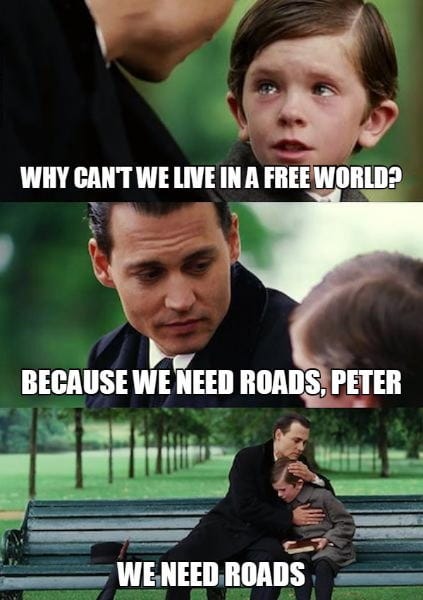





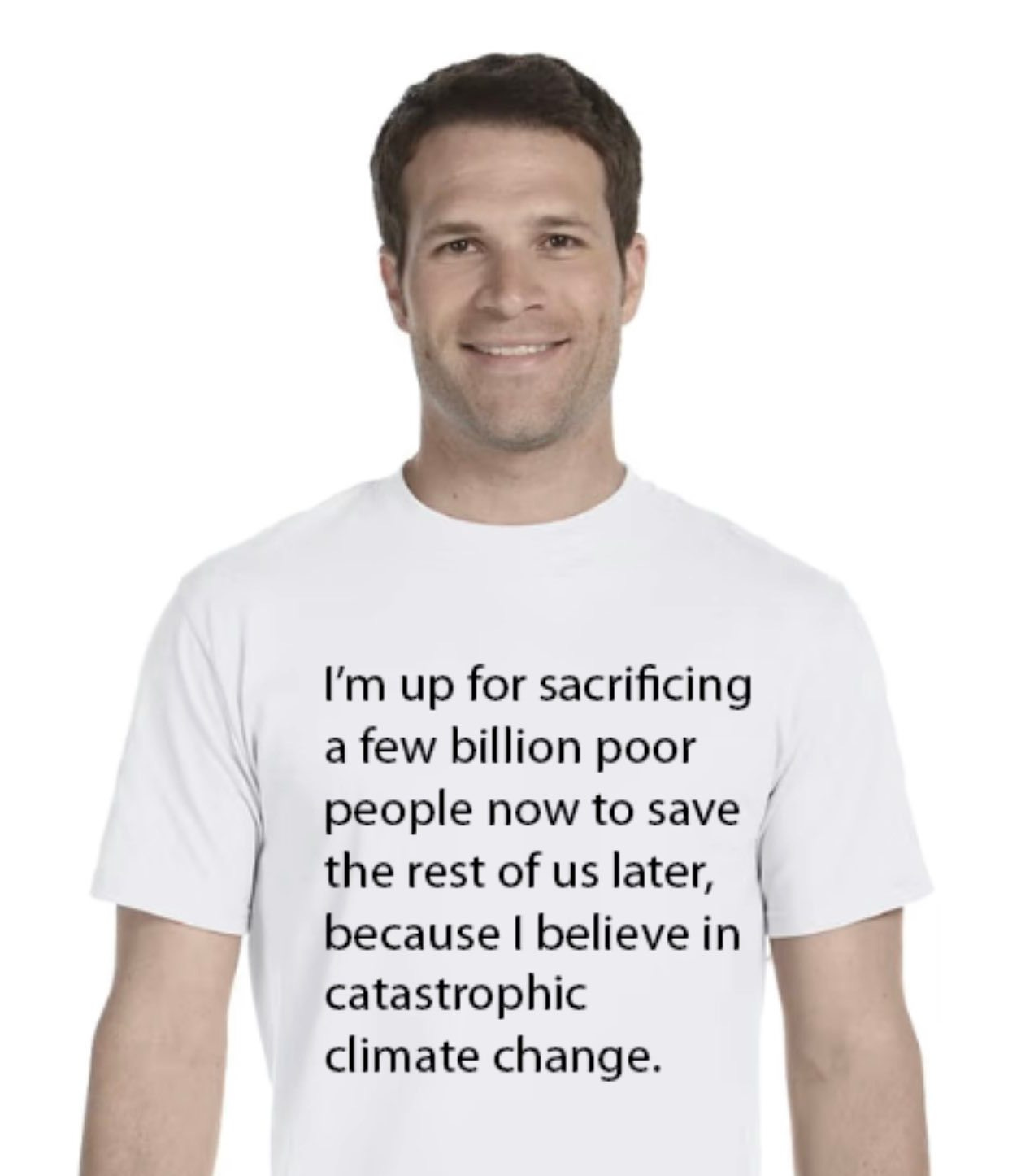
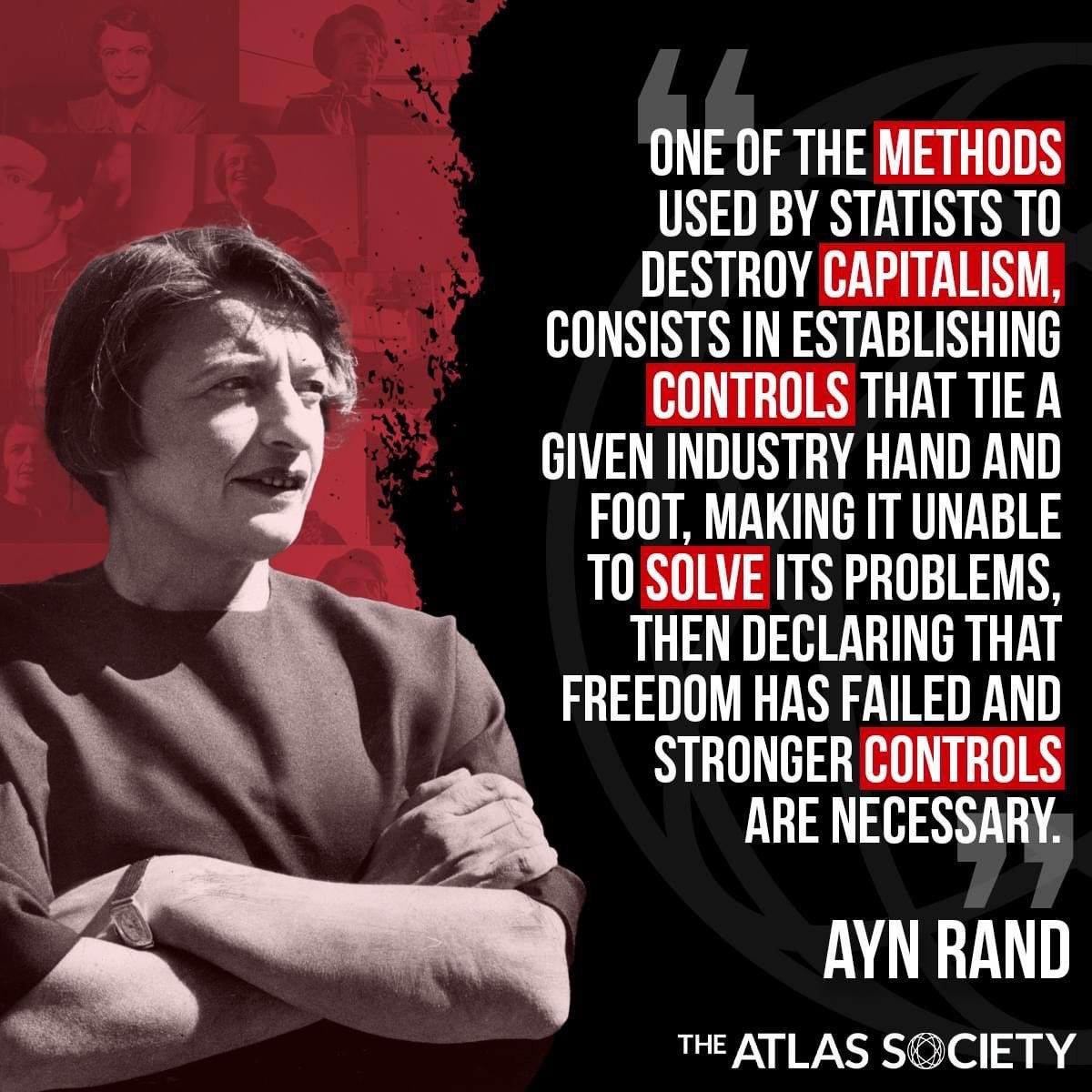

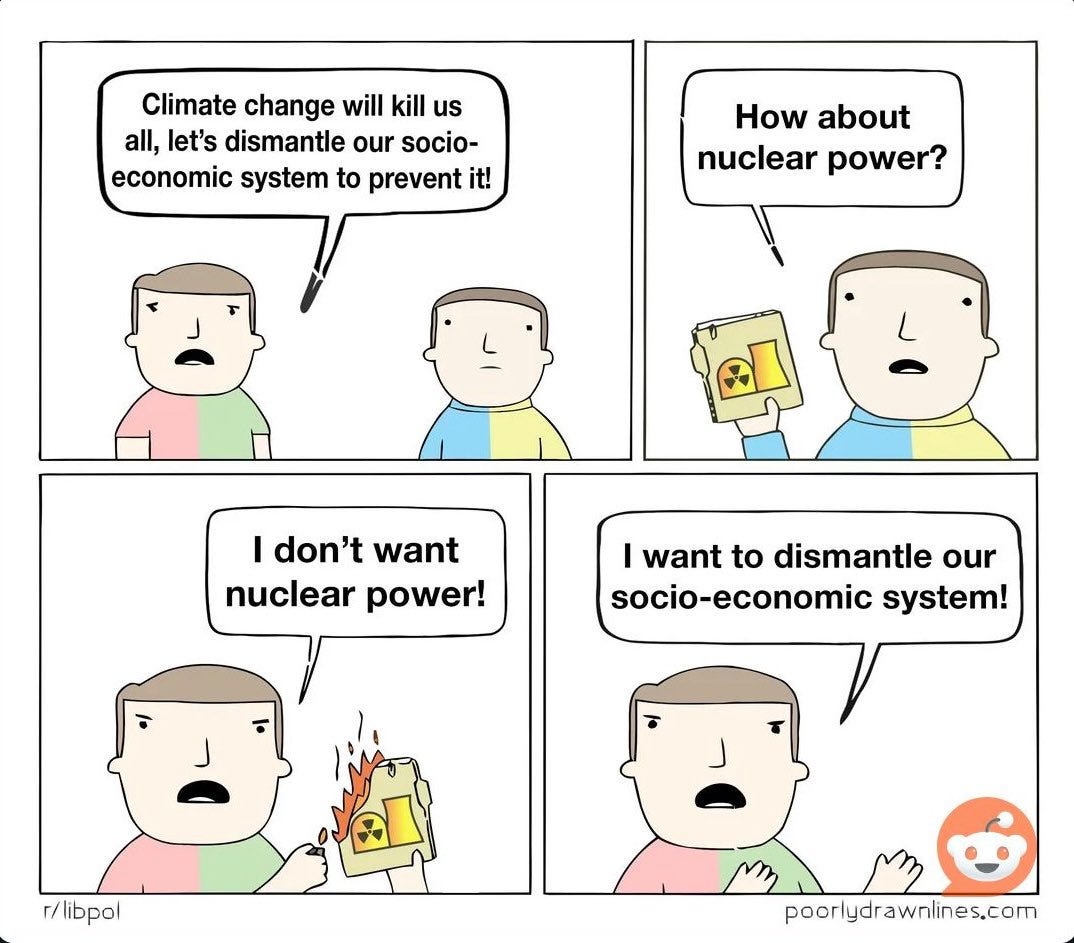

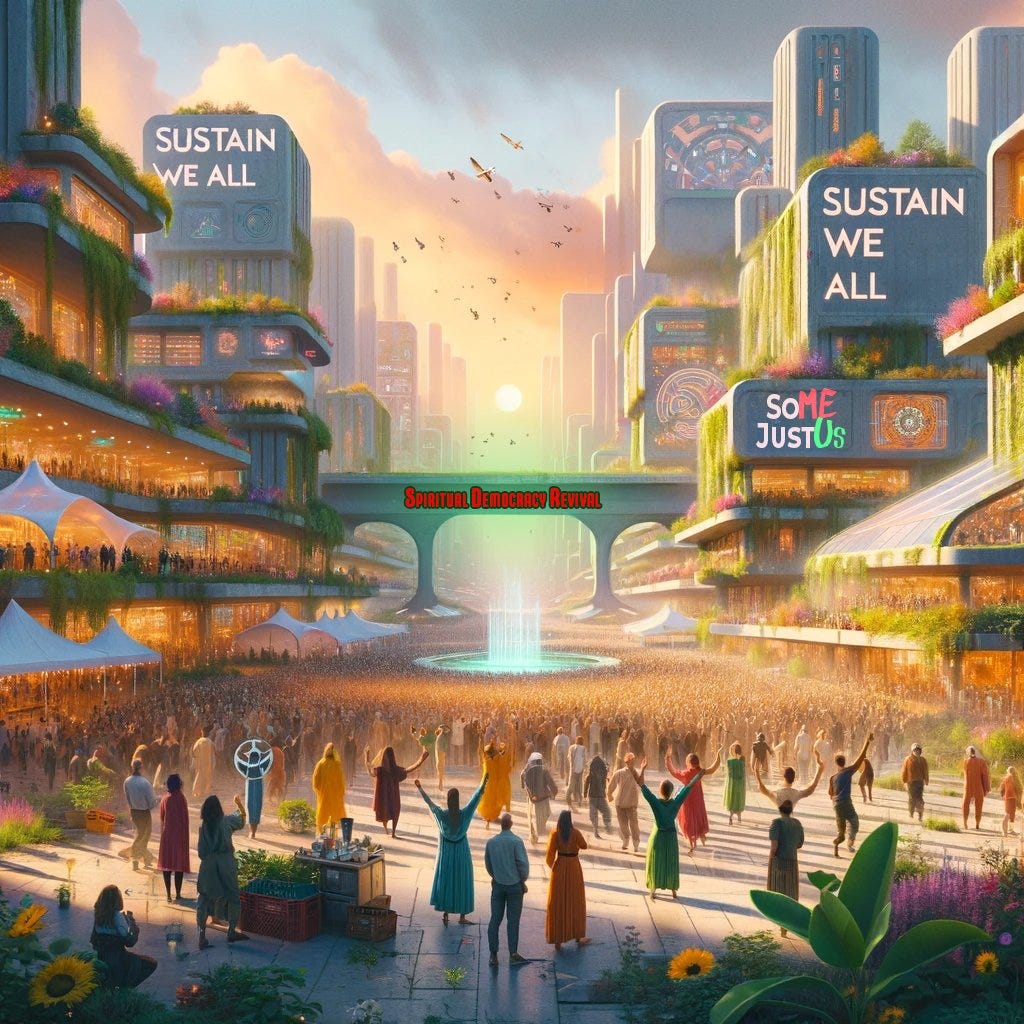
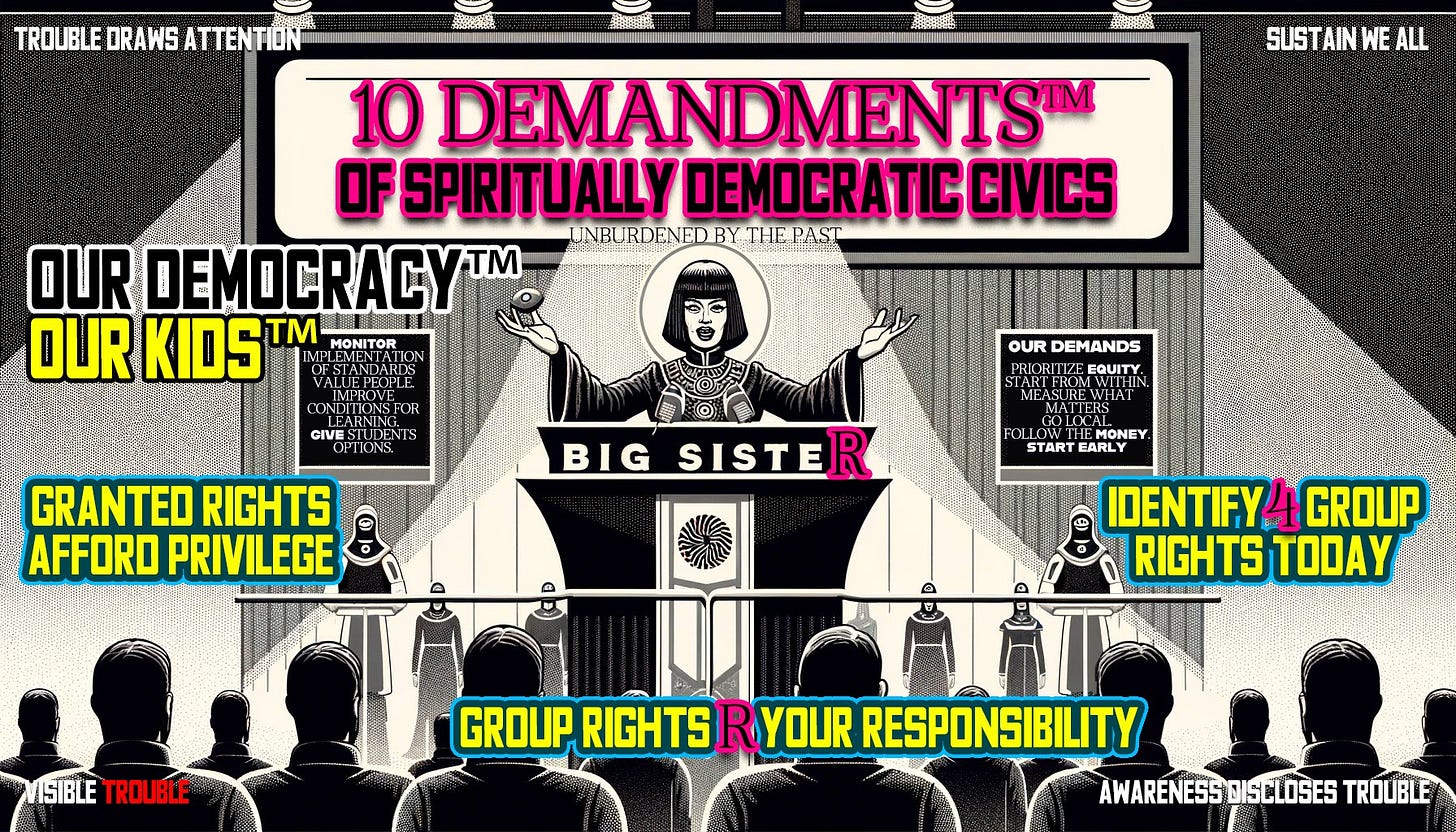




Paused my reading of this article to offer an anecdote after reading this:
"The roads argument is actually one of the less good pro-government arguments, given that roads are by their nature, not just decentralized, but reside in different political geographies, often resulting in the kind of road the locals roughly “want” to pay for..."
I recently spent a month in Austin Texas. Mostly going back and forth between Pflugerville and Round Rock, taking LYFT.
I was ASTONISHED at the abominable condition of the "side roads" my drivers took.
How long would a set of tires, and mufflers, SURVIVE?
The stuff of "Emerging Nations". Not kidding.
Ok, back to your article.
Latest on compliance culture - go to 7:40
https://youtu.be/uacSYweYnjw?si=MuNdmITm13mFokXT